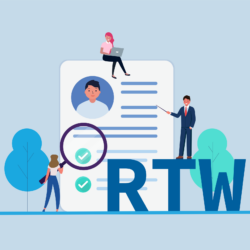Right to Work checks: Your FAQs Answered

With the Right to Work guidance changes that came into effect on October 1st, 2022, TrustID recognises the ongoing need for a straightforward approach to Digital Right to Work checks. As a certified Identity Service Provider (IDSP), TrustID offers a user-friendly solution for employers to navigate these changes with ease.
In this blog, we aim to highlight the most frequently asked questions about TrustID’s Digital Right to Work process, helping you gain a clear understanding of our service.
Q. Is TrustID a Certified Identity Service Provider (IDSP)?
A. TrustID became a certified IDSP in June 2022. To become certified, an IDSP must demonstrate their compliance against the trust framework rules, alongside any requirements specific to the particular Schemes, e.g. the RtW or DBS Scheme. At TrustID, we have the technology to deliver on the confidence levels specified in the RtW Scheme – Medium Level of Confidence (MLoC) – and the DBS Scheme – MLoC and High Level of Confidence (HLoC).
It is currently not mandatory for an IDSP to be certified to the digital RtW Scheme to perform digital Right to Work checks. However, the Home Office does recommend using a certified IDSP who can provide assurance that they meet relevant scheme guidance and the standards set out in the trust framework. For DBS checks, employers must use a certified IDSP.
Q. Why are Right to Work checks important?
A. All employers in the UK, regardless of the size of business or sector they operate in, must ensure that everyone who they employ is eligible to work in the UK. This means completing a Right to Work check – seeing and checking relevant identity documents – or carrying out a digital Right to Work check, for those people who are eligible. It is an offence to employ someone who you knew or had ‘reasonable cause to believe’ did not have the Right to Work in the UK including, for example, if you had any reason to believe that their identity documents were incorrect or fraudulent.
If you don’t complete the required checks on an employee and they are subsequently found to be an illegal worker, you could face a civil penalty of up to £60,000 and a range of sanctions, including the closure of your business or even a criminal conviction. However, correctly carrying out the checks required gives you a statutory excuse against liability which means you will avoid a civil penalty if you’ve (unknowingly) employed an illegal worker. Illegal working fines.
Q. Can we use an IDSP just for digital checks or can an IDVT provider offer wider Right to Work support?
A. There is a list of certified IDSPs on the Home Office website. The range of services they offer will vary. Some will only be to check UK & Irish documents. Share codes can be checked using the Home Office online service but some IDSPs also offer the option of an interface to that service, meaning that your team can process all remote checks through one portal.
While some, including TrustID can offer support for a wide range of Right to Work document checks, including, for example, out of date British passports, in reality, many employers will be recruiting employees in a variety of ways. So, before working with an IDSP, you must first consider whether to introduce technology only for digital checks or whether you use technology for all checks. TrustID can support Digital scheme, remote and in-person checks, as well as ID validation for DBS.
Q. Is the Digital Right to Work service easy to use?
A. User experience is one of the key benefits of technology. Both for your internal team and for the applicants who are being asked to complete identity checks. TrustID offer a solution which is easy to use, with a validation process that is easy to understand and produces clear, straightforward results. TrustID has a targeted response time of up to 2 hours, and both employers and applicants can contact our customer service team between the hours of 8am-midnight 365 days a year.
Q. How will the technology make your onboarding more efficient?
A. It goes without saying that any service you choose should make your check process easier. But how much time will you really save? TrustID are able to process a check in as little as a few seconds, and up to 2 hours, should it need to be checked by our expert human document analyst team.
A single, robust process throughout your organisation will drive efficiencies across your onboarding team. What’s more, candidates can upload their documents from anywhere, saving travelling time and costs. Read our case studies to find out more about the efficiencies our customers have seen.
Q. What do we do if our candidate doesn’t have an in-date UK/Irish biometric passport or eVisa?
A. You can use the Digital Right to Work Scheme for holders of in-date UK & Irish biometric passports. eVisa holders can be checked through the online Home Office service or by using an IDSP with an interface to the service. For other documents from List A or List B, such as out of date passports or birth certificates and NI numbers, as of the 1st October, you will need to see the original. TrustID can support with in-person document checking, including for out of date UK passports.
Q. Can we still make document checks over video?
A. Until 30th September 2022, Covid-adjusted guidance meant that document checks could be carried out over video calls with employees sending scanned documents or a photo of documents for RtW checks. As of the 1st October 2022 legislation changes, this check process no longer gives you a statutory excuse.
In the ever-changing world of Right to Work checks, TrustID can offer the best solution in simplifying the process. Your compliance and efficient onboarding are at the heart of what we do, and we’re committed to making this journey as straightforward as possible.
If you have any further questions, and our dedicated team is always ready to assist you further.
Sign up to receive updates
Receive notifications from TrustID direct to your inbox. Simply fill out your email address in the form below.
Want to find out more?
We’d be really happy to chat through your requirements and offer advice on the best service for your business.
Tel: 0118 466 0822 or email us.
Request a callback


